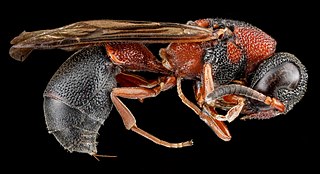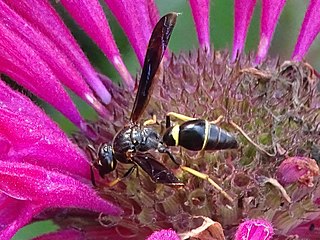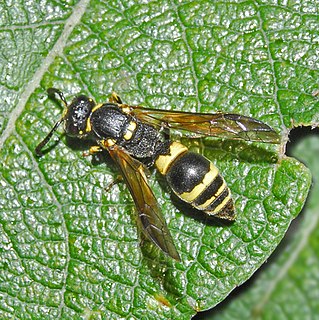
Potter wasps, the Eumeninae, are a cosmopolitan wasp group presently treated as a subfamily of Vespidae, but sometimes recognized in the past as a separate family, Eumenidae.
Plagiolabra is a neotropical genus of potter wasps currently containing 2 species found in the Gran Chaco biogeographical province of central South America, in Argentina, Brazil and Paraguay.

Leptochilus is a large, mostly Holarctic genus of small sized potter wasps. The genus reaches its largest diversity in the Palearctic where there are more than 135 species belonging to 5 subgenera. However the division of The division of Leptochilus into subgenera can not be fully supported and the status of some of them is dubious.

Parazumia is a Neotropical and Nearctic genus of medium to large sized potter wasps. The Nearctic species of this genus have been treated for much of the 20th century as a separate genus named Paranortonia.
Pseudacaromenes is a small Neotropical genus of large potter wasps containing two known species: the Amazon basin endemic Pseudacaromenes alfkenii and the widespread Pseudacaromenes johnsoni.
Pachymenes is a small but widely distributed Neotropical genus of potter wasps, it has been proposed that another Neotropical genus, Santamenes, be merged into Pachymenes.
Pachodynerus is a fairly large neotropical and nearctic genus of potter wasps with higher diversity in central South America. At least one species has been introduced in other biogeographical regions, including several oceanic islands, while Pachodynerus erynnis occurs on Ascension Island as well as in North America. This genus is most closely related to the genus Euodynerus.

Delta is an Old World genus of potter wasps with species predominantly distributed through tropical Africa and Asia. Some species are present in the Palearctic region, and a few have been introduced in the Nearctic and Neotropical regions. The members of this genus have a long metasomal petiole, like members of the genera Eumenes and Zeta.

Symmorphus is a primarily holarctic genus of potter wasps.
Knemodynerus is a genus of potter wasps distributed through the Palearctic, Afrotropical, Indomalayan and Australasian regions. The species currently classified in the genus are:
Ischnogasteroides is an Afrotropical and Palearctic genus of potter wasps. It currently includes the following species:
Gymnomerus is a monotypic Palearctic genus of potter wasps. The sole species is Gymnomerus laevipes.
Mitrodynerus is a monotypic genus of potter wasps with the single member being endemic to Sri Lanka.
Nortozumia is an indomalayan genus of potter wasps.
Paragymnomerus is a palearctic genus of potter wasps.
Parodontodynerus is a Palearctic genus of potter wasps.
Pseudoleptochilus is a small Palearctic genus of potter wasps consisting of two species.
Pseudosymmorphus is a small Palearctic genus of potter wasps from North Africa and the Middle East, containing four species.
Spinilabochilus is a Palearctic genus of potter wasps.

Rhynchium brunneum is a species of potter wasp found in Asia. Across the wide range, they show considerable variation in the patterning and several subspecies have been described, including:





